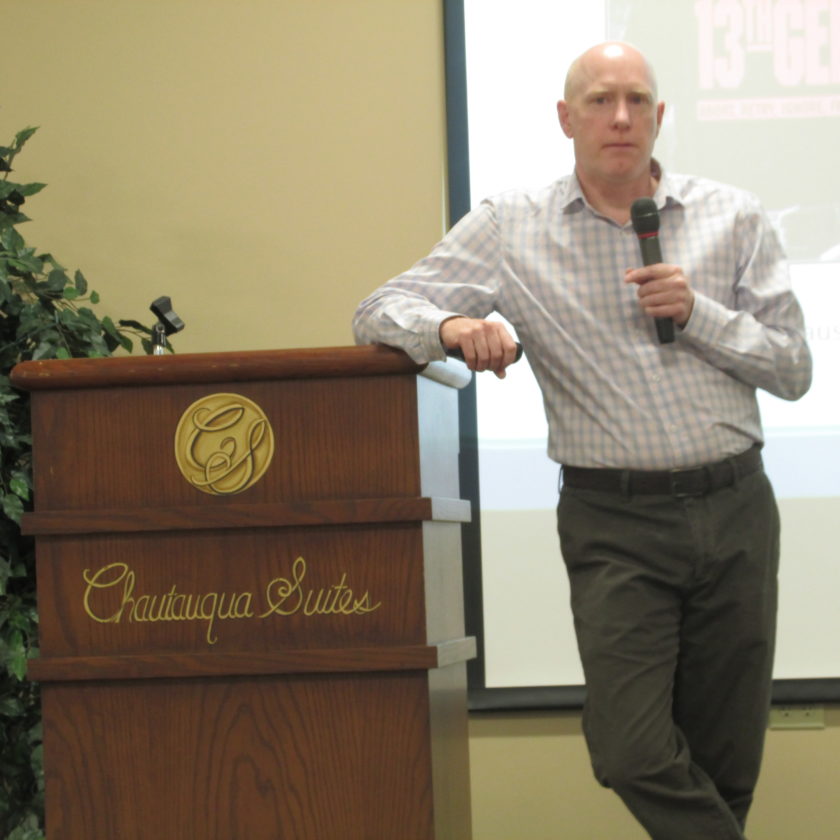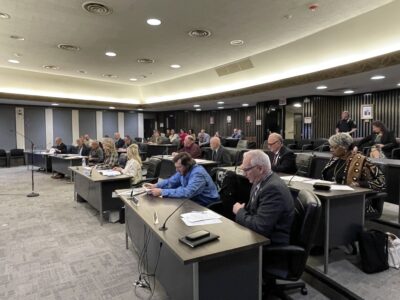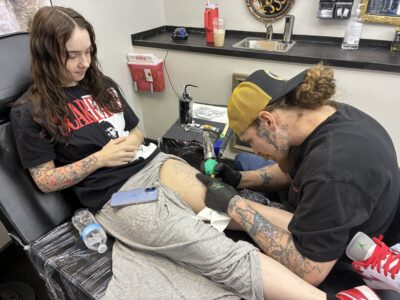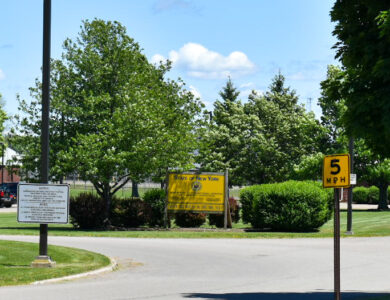Opioids, Marijuana Are Exceptions To Millennials’ Good Behavior

Rodney Wambeam discusses the millennial generation during the Hope and Healing for Chautauqua Forum at the Chautauqua Inn and Suites on Tuesday. Photo by Damian Sebouhian
“Millennials represent the most diverse generation in the history of America,” said Dr. Rodney Wambeam to a full house of stakeholders in the arena of substance abuse care and prevention.
Wambeam was the keynote speaker during Tuesday’s Hope & Healing forum at the Chautauqua Inn and Suites in Mayville. Wambeam, a senior research scientist at the Wyoming Survey and Analysis Center of the University of Wyoming was invited by the committee to be the keynote speaker for the event, and focused his presentation on “Boomers, Xers and Millennials: How New Research on Generations can inform the Future of Prevention.” Wambeam peppered his talk with humor and wit while challenging some of the myths and misconceptions surrounding the millennial generation, whose population is estimated at 80 million people in the United States, a population that, Wambeam says, “is still growing due to immigration.”
“We haven’t seen this amount of immigration and diversity since the 1880s when people were coming through Ellis Island,” said Wambeam. “Now, let’s talk about what’s wrong with them.”
Wambeam’s statement soon proved to be tinged with irony as he explained that “in nearly every case, millennials behave better than the generations that came before them. Their version of rebellion is to behave well. This isn’t just (regarding) alcohol and cigarettes, it’s for wearing a bicycle helmet and violence in schools. In the media, you hear about shootings in schools, but violence in schools, like bullying and carrying firearms to school, is way down over the last 20 years.”
Wambeam credited the “Gen Xers” — the parents of millennials — as having a hand in creating a stronger atmosphere of prevention.
“We did that for them. We have been preventing (unhealthy behavior),” he said. “What was prevention like when I was in school? ‘Just Say No.’ I didn’t know how to get dressed in the morning, I’d have these two t-shirts laying out on the bed and one says ‘Just Say No’ and the other says ‘Just Do It’. That was as good as prevention got.”
The two exceptions to the millennial’s good-behavior track record, Wambeam said, are with opioids and marijuana. Punting the opioid topic to later speakers, Wambeam said that the problem with most millennials regarding marijuana is with the current climate of legalization.
“What we’ve seen with this generation is a real lack of perspective with the risks of marijuana because of its medicinal use, and because it’s being legalized everywhere,” said Wambeam. “What you have with this generation is a real lack of perception of risks. They think it’s safer or a green drug because it’s grown like a plant, it’s like eating your vegetables, really.”
Wambeam reminded the crowd that millennials are growing up and will soon be taking on more and more authority in shaping our society.
“Millennials aren’t kids anymore. They’re up to 36 years old. They’re having children, buying houses, running businesses and having careers,” he said. “It’s only the tail-end of the generation that’s still in high school right now.”
Wambeam explained that the myth spread mostly by gen-xers and baby boomers that millennials are “lazy, and narcissistic,” was born from the fact that “millennials are the most nurtured generation in the history of the world.”
This nurturing has translated into the workplace, as millennials are transforming it into a more flexible cooperative environment, which Wambeam says, is a good thing.
“Embrace the millennial workplace culture. It’s actually great. It’s what everybody wants: flexibility. If your kid gets sick you can go home. It’s a flexible, collaborative, supportive work environment and it’s what we should all have,” Wambeam said.
One universally perceived characteristic of the millennials Wambeam admitted to being true regards technology.
“They use it more, they’re better at using it,” Wambeam said. “They have more Facebook friends than anyone else. On average, they send and receive roughly 88 text messages a day. Millennials are technologically dependent. Some of them do know how stuff works, but mostly they’re just dependent upon technology.”
Wambeam ended his presentation with a list of measures for those in the addiction-prevention field and those members of previous generations who work with millennials should consider when dealing with the most socially conscious generation in history.
“Stay the course,” Wambeam said. “We have been doing a great job with millennials. We have to keep doing our work. Keep giving them prevention programs and treatments that work. This is a generation of people that cares deeply about making the world a better place. Seventy-nine percent say it’s more important to enjoy your job then to make money. This is the first generation in the history of surveys that has said that it’s more important to make the world a better place than to make money. How do we leverage that notion of caring for the world into caring for themselves and do better at prevention treatment?”
To find Wambeam’s full presentation about millennials, go to www.rodneywambeam.com.






